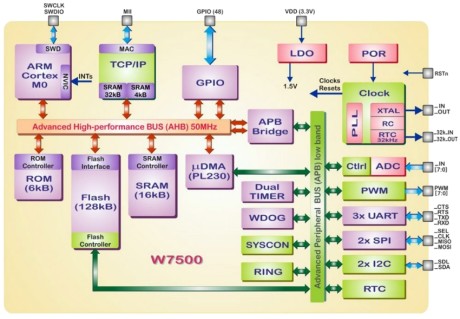Writing programs
As with MCU programming several options are available. First of all, and easiest because it requires zero installation and no extra hardware is the free online mbed IDE. The advantage of this option is the availability of many high-level libraries making application development rather easy. However, mbed does not (yet) allow for debugging other than with printf statements and blinking LEDs. This may be a show-stopper for production quality software, but it is great for quickly throwing a prototype together.
In-depth programming, i.e. with debugging, is, of course, possible too, all you have to do is to get yourself proper tools. The WIZwiki-W7500 website not only has full details on how to setup debugging, it also explains the steps necessary to install and configure popular toolchains like Keil, gcc and ARM (the not-Keil toolchain). An extensive library can be downloaded to support the W7500 and its peripherals, so the offline developer does not have to write everything from scratch.

Besides the abundant documentation the WIZnet website - where, strangely enough, programming examples lack - also has a so-called Museum where example projects from other users are exposed. You can study these to get inspired. Even though these projects are not specifically for the WIZwiki boards, the applied principles are valid for them too. The older WIZnet hardware TCP/IP stack had less simultaneous sockets, some parameters may have changed and the MCUs had fewer peripherals, studying these projects will definitely shorten your “time to market”.
In-depth programming, i.e. with debugging, is, of course, possible too, all you have to do is to get yourself proper tools. The WIZwiki-W7500 website not only has full details on how to setup debugging, it also explains the steps necessary to install and configure popular toolchains like Keil, gcc and ARM (the not-Keil toolchain). An extensive library can be downloaded to support the W7500 and its peripherals, so the offline developer does not have to write everything from scratch.

Besides the abundant documentation the WIZnet website - where, strangely enough, programming examples lack - also has a so-called Museum where example projects from other users are exposed. You can study these to get inspired. Even though these projects are not specifically for the WIZwiki boards, the applied principles are valid for them too. The older WIZnet hardware TCP/IP stack had less simultaneous sockets, some parameters may have changed and the MCUs had fewer peripherals, studying these projects will definitely shorten your “time to market”.
Read full article
Hide full article


Discussion (0 comments)